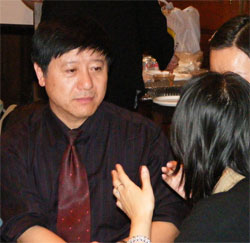Jin Qiu Zhang, headmaster at Dayu Branch Middle School in Beijing, learned about the American educational system during a visit to Teachers College. Zhang was one of 15 Chinese principals who visited New York City public schools headed by administrators in TC's Cahn Fellows Program for Distinguished New York City Principals.
Jin Qiu Zhang will be the first to tell you that there are differences in the way American and Chinese principals run their schools. And yet, despite the myriad social and cultural idiosyncracies, he will also tell you that when it comes to the age-old arts of teaching and learning, things are more alike than anything else.
“One of the impressive things about American education is the focus on students’ interests and building on these interests to promote learning,” says Zhang, headmaster at Dayu Branch Middle School in Beijing through an interpreter. “But what I find most is that American and Chinese principals are the same in that they have a strong sense of responsibility and want to do their jobs very well to help their students.”
Zhang should know, having spent the two weeks in mid-November at TC, where he and 14 other Chinese school administrators took part in the first formal exchange between principals in the Beijing Institute of Education’s Excellent Principals Program and their American counterparts in TC’s Cahn Fellows Program for Distinguished New York City Principals. The Chinese principals met with faculty members and visited 10 New York City public schools, nine of which are headed by Cahn Fellows principals.
“Many of our principals have read and heard much about American education and U.S. schools,” says Jin Hui, Associate Director of International Exchange Affairs at the Educhina Group, a subsidiary of the Beijing-based Society of Chinese Education, which helped organize the visit. “But when you actually visit a school, it is a very different experience. The focus has been on educational leadership because they are principals, but the overall goal has been to exchange ideas and to learn from American education and, at the same time, have the New York principals learn about education in China. Hopefully, we are bringing new ideas from China as well.”
The visit comes amid increasing ties between Teachers College and Chinese educational institutions. Mun Tsang, Professor of Economics and Education, founded the Center for Chinese Education in 2000. In 2006, TC and Peking University initiated a master’s degree program in which students spend the first year at Peking University and the second at TC. And this fall, TC welcomed 11 visiting Chinese scholars for the academic year.
Cahn Fellows Program Director Krista Dunbar said that it’s possible Cahn Fellows may be able to visit their Chinese colleagues next year as part of the evolving exchange program. The 15-month Cahn Fellows program allows some on New York City’s most accomplished principals to meet every other month at TC for study group sessions in which they work on challenges they have identified in their schools. An aspect of the program is the study of leadership across cultures and organizations as a vehicle for informing the practice of educational leadership at the local, national, and international levels.
“This kind of exchange makes sense because these are some of the best principals in China coming together with some of the top principals here in New York to learn from each other and generate new knowledge,” Dunbar said. “These principals understand that their students will be entering a more globalized world and the opportunity to learn from each other is very valuable.”
Cahn Fellow Donna Finn, principal of the Frank Sinatra School of the Arts in Queens, hosted a group of eight Chinese educators for a tour of her school on November 18th. For Finn, the value of these kinds of exchanges is in getting a sense of how other countries approach teaching and learning while “re-learning” what is universal about education and schooling.
“One of the gentlemen from China was telling me he ran a similar school to mine in Beijing and it was kind of reassuring when we spoke because he was dealing with many of the same issues,” Finn says. “In fact, the principals were asking about students dating and whether we intervened when we saw that taking place. So you really get a sense that education is a worldwide mission and we are all dealing with some of the same kinds of things.”
Educhina has been coordinating twice-a-year visits of Chinese educators to TC since 2004. In fact, some 200 Chinese educators have visited TC over the years. However, it was through the efforts of Robert Monson, a lecturer in the Department of Organization and Leadership and Director of the Educational Policy Fellowship Program, that a group of Chinese educators where able to meet Cahn Fellows for the first time last April. With the advent of the principals program at the Beijing Institute of Education this year, establishing a more formal exchange was the logical next step. In addition to the 15 principals, the Chinese delegation included three district-level education officials and four faculty members from the Beijing Institute of Education.
The exchange is a great fit, Monson says, because it links highly skilled administrators who run urban schools and are working through issues of educational reform and change. Monson is convinced that there is much each can learn from the other.
“It’s amazing how closely the Chinese and New York City principals view their roles,” Monson said. “I asked them what their vision of the purpose of education was in their schools and what the major barriers were to accomplishing that purpose. Both the Chinese and American principals gave remarkably similar answers: to develop the whole person and not just the cognitive ability of their students, but to help them develop into good citizens and all those good things you would expect from a principal. And they both agreed on the same barrier: testing.”
Published Monday, Dec. 1, 2008
